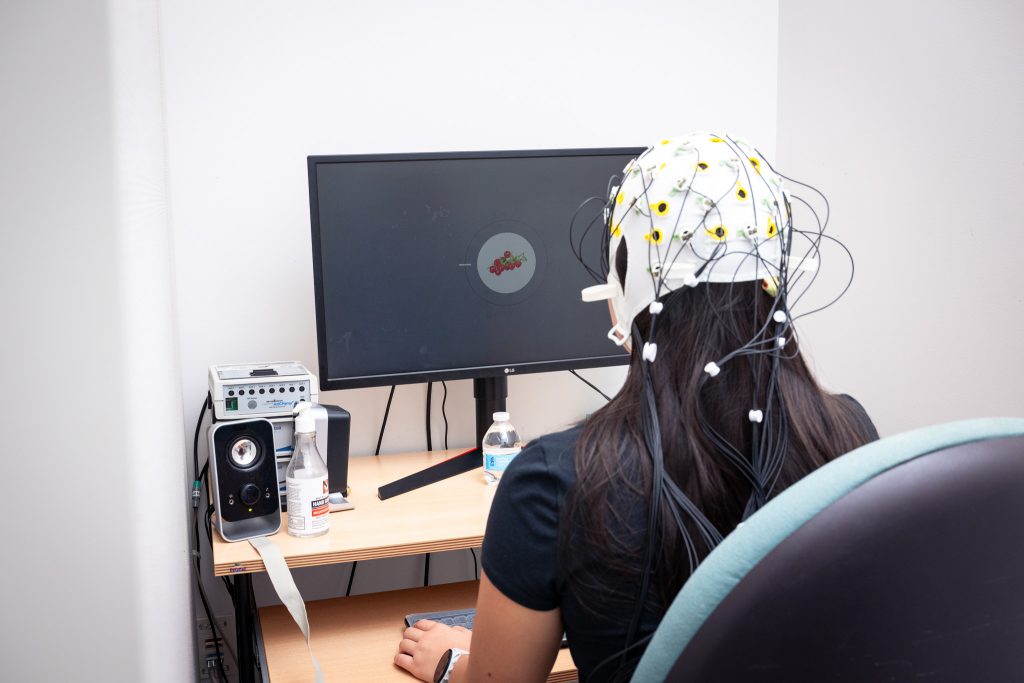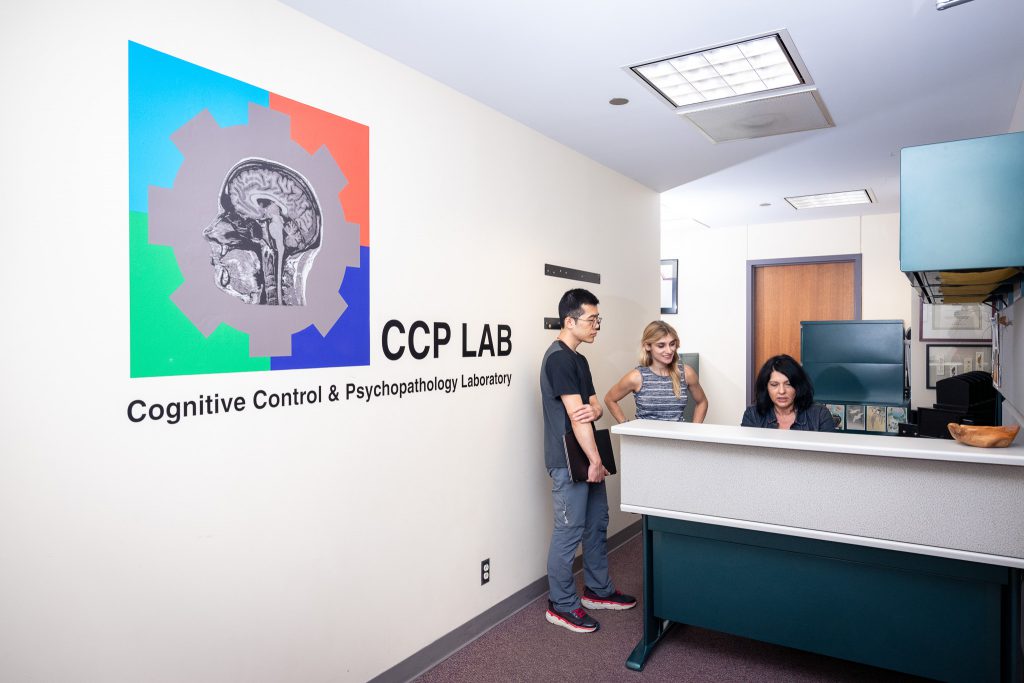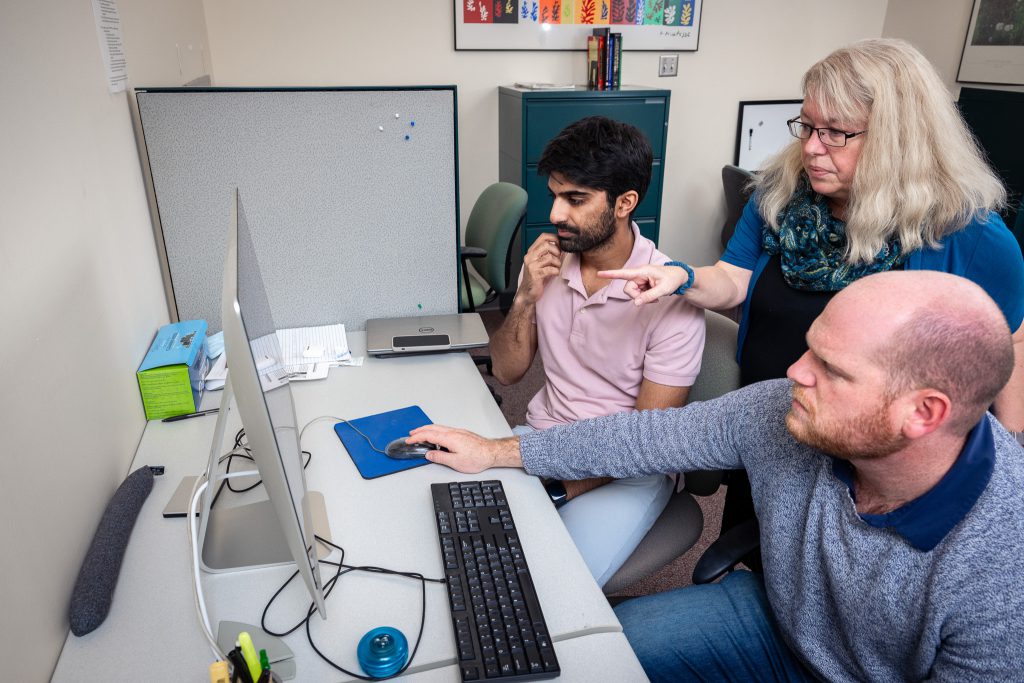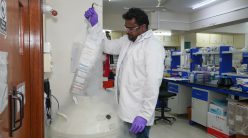Deanna Barch is a well-known figure in the field of psychiatry. She has spent over three decades studying the psychological and neural mechanisms underlying the development of mental illness, particularly schizophrenia and depression. While her research primarily focuses on adults, she also studies the risks of mental illness in children due to early adversity, such as poverty, stress, and disparities in access to healthcare. Currently the Gregory B Couch Professor of Psychiatry and the Chair of the Department of Psychological and Brain Sciences at Washington University, she is the recipient of several awards for her pioneering work.
Deanna recently visited IISc for the sixth Bangalore Cognition Workshop organised by the Centre for Neuroscience, where she spoke to a packed Faculty Hall about how neuroscience approaches can deepen our understanding of mental illness. On the sidelines of the talk, she spoke to CONNECT about schizophrenia and its treatment and risk factors, misconceptions about mental health, and her choice of research over a clinical career.
[Note: This interview contains sensitive topics, including discussions of schizophrenia, depression, and suicide]

What initially drew you to study mental health challenges and disorders?
Back in high school, I was a peer counsellor for kids with mental health challenges. My brother had dyslexia and really struggled in school. I wanted to become a school psychologist to help kids like him.
When I took psychology courses in college, a professor asked me to join her lab as an assistant, which I really enjoyed. After graduation, unable to decide between research or a clinical route, I took a year off to work for a pilot project in Chicago helping patients with chronic mental illnesses. It was a rough experience. I distinctly remember one young client who’d had his first psychotic breakdown in college and never really recovered. I had just graduated college, and I had the opportunity to think about my future. And here was this kid, with his own hopes and dreams, but unable to pursue them. It struck me then that the one-on-one therapeutic relationship, though important, could only help a few people. But by doing research on mental illness, I could help a lot more [people].
So, I decided on graduate school. I knew I was interested in schizophrenia from early on, based on patients I saw in Chicago. My work has now certainly expanded far beyond schizophrenia, but that has been a thread from the very beginning.
How has the perception of schizophrenia changed, historically versus now?
Well, some things have changed and some haven’t.
One of the early writers about schizophrenia, Emil Kraepelin, talked about schizophrenia as dementia praecox, that is, early onset dementia. He saw patients with dementia praecox that progressively got worse and became chronic. Elements of that are still true, but we now know that some of that was because of the absence of treatment at that time, and that it is much more of a spectrum. There are people with dementia praecox, but there are also people who are more stable and can recover. And that, I think, is hopeful for patients.
By adopting neuroscience approaches, our understanding of symptoms is also changing. For example, some patients have disorganised speech. We are trying to understand whether the disruption is in their thinking, belief systems, or their ability to translate ideas into language.
By doing research on mental illness, I could help a lot more people
What are some of the most common symptoms of schizophrenia?
There are two categories.
Positive symptoms are experiences patients have that other people normally don’t, such as hallucinations, delusions, formal thought disorder – speech that is difficult to understand or follow – and disorganised behaviour, like odd motor movements and gestures.
Negative symptoms are the absence of things you would normally expect to have, such as asociality (missing social interests,) flat affect (missing expression or affects on the face), and alogia (a reduction in the amount of speech or slow pauses).
You also study early-onset mental illnesses in children. Could you talk a little more about that?
Some people acutely develop a psychotic episode in late adolescence or early adulthood. It’s sometimes associated with substance abuse – like marijuana, phetamines, stimulants, or psychedelics.
But often, when symptoms develop in adolescence or early adulthood, you can retrospectively see some indicators from early childhood like motor abnormalities, cognitive challenges, and social withdrawal. In rare cases, you see the development of full-blown psychosis at a very early age. I’ve seen it [in children] as young as seven.
In about 25-40% of adolescents, we are seeing the transient emergence of psychotic-like experiences, so mild that some people might not even call them psychosis – like having imaginary friends, magical thinking.
But in a subset of those kids, these experiences will continue and become stressful. We think those kids are more on a spectrum with psychosis and may be at risk for developing additional symptoms later on. In a project called the Adolescent Grading and Cognitive Development Study, we are studying such measurements starting at age nine.
What factors make children more predisposed to such conditions?
Schizophrenia has a significant genetic contribution. But there are definitely non-genetic factors. The risk among the general population for full-blown schizophrenia is 1% – it is not a very common disorder.
Birth complications like anoxia or having the umbilical cord wrapped around the neck, and inflammatory infections in the mother during the second trimester can increase risk. For mothers in their second trimester who experienced stress during hurricanes and earthquakes in China, or great ice storms in Montreal – their kids were found at a slightly increased risk.
There’s also a host of environmental factors like social adversity, low socio-economic status, minority status in a majority country, first-generation immigrant status, pollution and toxins in the environment, and so on.
The big thing that everybody’s trying to work on now is calculators that give a good estimate of the likely risk of developing schizophrenia. At the very least, they will help us design early non-invasive interventions.
The risk among the general population for full-blown schizophrenia is 1% – it is not a very common disorder
Currently, what are the treatments for schizophrenia?
The best possible treatment is coordinated speciality care, which happens in places like Australia, the UK, and the USA. It involves diagnosing as early as possible and providing multi-pronged treatment, which includes antipsychotic medication at appropriate dosage, educating family members, individual psychotherapy (like cognitive behavioural therapy), and vocational or occupational therapy.
But in reality, most people only get medication; the rest is a pretty expensive package. Medication is mostly helpful for positive symptoms, but doesn’t really help with the negative symptoms. It also has its own side-effects like motor issues and weight gain.
There is now a lot of focus on identifying new medications without some of these side effects, with some promising things in the works.

Working in mental health must be challenging. Did the shift from working personally with clients to a research route help you?
Even though I’m trained and licensed, personally, I don’t think I’m well-suited for full-time clinical care. Partly because I have a really hard time “leaving it at the office (laughs).” It was emotionally draining for me.
I have so much respect for the people on the frontlines, working with clients every day. It can be very rewarding when people do well, but some people really struggle to follow the treatment plan or have relapses.
It was probably better for me to be more on the research side. But I also value one-on-one interactions with people, because sometimes it’s easy as a researcher to lose track of what the daily experience is for people. Like, if you ask a client with schizophrenia: “What do you want to do better?” They’re not necessarily going to say: “I want fewer voices and delusions.” A lot of times, they say: “I’m lonely. I wish I had a bigger friend group. I wish I could work.” They tend to focus more on quality-of-life issues because those are what cause a lot of distress.
If you ask a client with schizophrenia: What do you want to do better? … A lot of times, they say: ‘I’m lonely. I wish I had a bigger friend group. I wish I could work’
That’s true. Loneliness is one of the biggest things that people having mental health challenges deal with.
Yes, very much. They often have reduced opportunities for social engagement. In the worst-case scenario of a chronic illness, you may be living in a group home. Your friends may have very different lives than you now, with nothing in common.
I think there are two things we need to tackle – how to make it easier for people to have social connections, and how to ensure that they overcome loneliness. Is it a cognitive problem, an emotional recognition problem, or not being able to open up? Is it being absorbed by your inner anxiety so that you’re not really in the moment in that social interaction?
Could support groups help?
Definitely. Because part of the discussion is not only how to get people to be social but also the logistics of how you help them to be – some people are maybe not working, don’t have a lot of finances, maybe they can’t drive. Sometimes the illness prevents people from being able to engage in some of those things. Peer support could help.

What are some major misconceptions about mental health that you have noticed?
About schizophrenia, there are three major misconceptions. One is that they don’t suffer. But they are very much suffering. Delusions and hallucinations associated with schizophrenia are almost always negative in content.
Another misconception is that they are more violent than other people, and that really isn’t true. People can be violent in response to delusional voices, but you don’t need to be afraid of people with psychosis.
And the third is that people confuse schizophrenia with multiple personality disorder, now called dissociative identity disorder. I see this framing misused all the time in the media, literature, and in general conversation.
In general, I think that the biggest misconception about mental health is that people think talking about it will make it worse. That is just not true. I think that’s particularly a concern in the domain of suicide. People are very afraid that asking someone if they are thinking about hurting themselves is going to make them think about hurting themselves. That’s absolutely not true.
The only exception to that is in schools, which have some evidence of social contagion; when one child hurts themselves, and then there’s an intense discussion on social media, evidence suggests that that can increase rates of suicidal ideation.
But that’s very different from you as a caring family member or friend asking someone about their thoughts.
There are quite a few TV series and movies that address this…
Like 13 Reasons Why… which was terrible. That glorified suicidality in a way that was not helpful! There’s one more misconception … which is that you have to be depressed in order to commit suicide. No doubt depression is a massive risk factor for suicide, but some people commit suicide even when not depressed, for a variety of reasons like despair or chronic health conditions, over family issues, and other things.
There’s also been a lot of talk about the gut microbiome and mental health. You’ve also been involved in some studies related to that. Can you tell us more?
Truth be told, we haven’t done a lot of research yet. The work that I’ve done is more related to how early social adversity influences the gut microbiome. And now we’re looking at whether it predicts mental health concerns.
I am not an expert in this, but there’s some work suggesting that ketogenic diets might help treat bipolar disorder. There’s also evidence of the microbiome modulating the vagus nerve – we know that vagus nerve stimulation can also be a treatment for depression. It’s a young field; not a lot of definitive answers yet, but a lot of excitement.
For example, in early development, the gut microbiome of breastfed children has a greater proliferation of anti-inflammatory microbes, which are good for the child. And kids who are not breastfed have a greater proliferation of pro-inflammatory microbes, which are not as great. There’s a huge push for breastfeeding, but there are so many social factors that hinder it, like access to nursing rooms.
We’re looking at how early social adversity influences the gut microbiome and whether it might predict mental health concerns

Compared to mental health issues, do you feel physical health issues are given more priority in society?
I mean, it is ridiculous, right? We’re putting a disproportionate amount of money into physical health conditions compared to mental health conditions given their relative burden of disease. And that always gets me frustrated. I don’t want to reduce the resources for physical health conditions, of course; I would just like to increase the resources for mental health conditions.
It’s a shame because they’re so intimately intertwined. There’s evidence that cancer treatment itself causes mental health concerns – which in turn makes prognosis worse – and evidence about heart problems being exacerbated by depression. Paying more attention to mental health would actually help the physical condition.
I think this separation exists because there’s still more stigma associated with mental health conditions. In many cultures, it’s just not okay to talk about mental health.
Yes, in countries like India, it’s improving, but not enough yet.
It’s starting to change. I think the biggest reduction in stigma has been in more westernised countries. But I’m starting to see a lot of effort [in other places too], like in Africa.
I’m involved in a few international groups and we’re trying to promote discussion and ensure culturally appropriate measurements and assessments because different cultures talk about mental health in different ways. China too, interestingly, is spending a lot of resources on mental health, but they talk about it in a slightly different way, because there’s still a lot of stigma.
Do you think social media helps or harms? How do you feel about the rapid rise of “wellness influencers”?
There are pros and cons, because it’s not moderated. I think some people are putting out awful stuff that is not useful. But there are a lot of helpful online support groups for parents for different forms of mental illness. It has opened up a forum for people to feel like it’s okay to talk about their concerns, and to understand that other people are having some of the same experiences. Some of them share accurate and valuable information.
I just don’t know how to help people distinguish between the informed people and those putting out stuff that there’s no evidence for!




